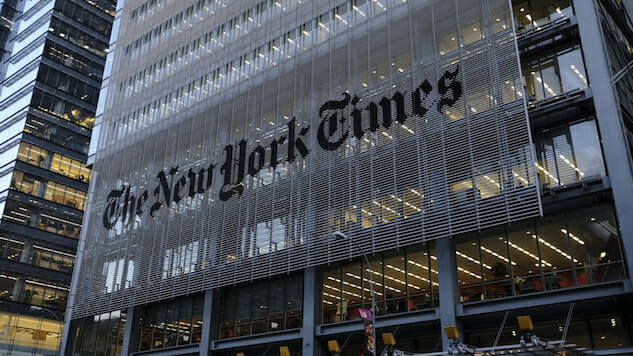The Fourth Estate: The New York Times Plays Itself
Photo: T.J. Kirkpatrick/SHOWTIME
Donald Trump’s presidency seems to have pushed everyone to the limit, regardless of how you judge the White House. But if you’re someone who works in The New York Times’ New York or Washington, D.C. bureaus (or reads their coverage), you’ve been driven to exhaustion from the get-go. Their work covering the first year of the Trump administration is documented in the harrowing Showtime series The Fourth Estate, and it’s an effort as hard to accept and as unsatisfying as the actual coverage it depicts.
Don’t get me wrong, it’s an achievement, to be sure. Did I like it? Is it good? That’s not really what’s going on here. Like the subject matter of The Fourth Estate, which is how to report on someone or something that wants to fight you all the way to the finish line, you have to start by asking the right questions.
So what does The Fourth Estate do? Well, Liz Garbus’ docuseries, of which critics got to see three of four parts, tackles the dueling forces mostly recently seen at work in Steven Spielberg’s The Post. It’s the business of newspapers versus the ideals of newspapers, the personal ambitions of reporters versus the ethical ambitions of reporters, what power says and what power does. This modern update is so thorough that it can feel superfluous if you’re caught up and overwhelming if you’re not. Well, it’ll feel overwhelming no matter what your situation, since that’s by design. But it’s not here as a substitute for a subscription.
The Fourth Estate isn’t meant to pass along the news or even deepen the understanding of the already informed, but to provide perspective and humanize the journalists for whom this administration has changed from the Wild West to Westworld. It’s pushed them to their logistical and professional limits while making social media stars of some and villains of others (which the series highlights, obsessing over on-screen depictions of Twitter almost as much as those addicted to the service, me included), veterans of the war between facts and lies.
From Trump’s inauguration, which kicks off the first episode, this has been deemed a presidency of darkness: The Times’ longtime rival The Washington Post even adopted as its slogan, “Democracy Dies in Darkness.” This assigns the news the responsibility of shining a light to save the life of democracy. That’s a task so big it’s hard to avoid hearing about it if you’ve been on the Internet, watched TV, or read a paper in the last year. It’s as if every reporter were prepared to become Woodward and/or Bernstein (which, c’mon, applies to every journalist even under normal circumstances) simply because there’s scarcely a good faith façade of competency or cooperation from the subjects they’re covering.
-

-

-

-

-

-

-

-

-

-

-

-

-

-

-

-

-

-

-

-

-

-

-

-

-

-

-

-

-

-

-

-

-

-

-

-

-

-

-

-








































